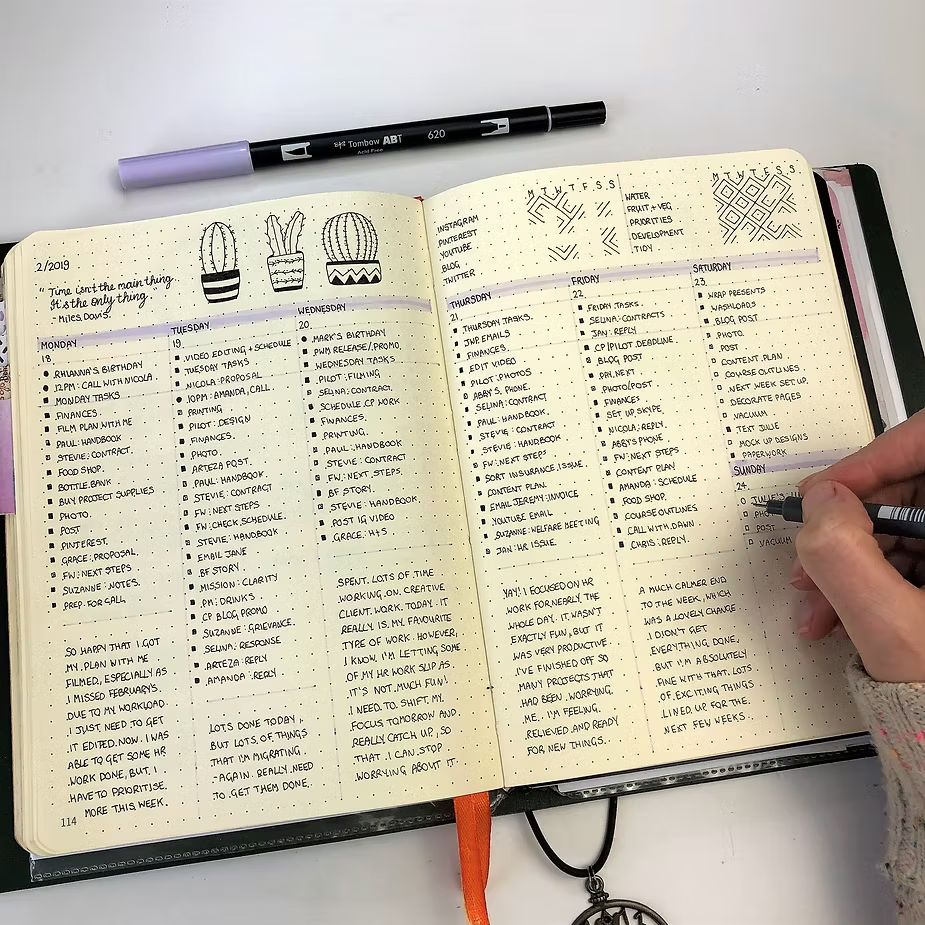You finally sit down with your journal, pen in hand, ready to write, and then… nothing. Your mind goes blank.
What are you supposed to write?
Even as a seasoned journaler, I still hit a wall from time to time. It’s not that I don’t want to write, I’m just not always sure where to begin. And with so many methods and styles out there, it’s easy to feel overwhelmed.
You likely relate, and that’s why you are here. This guide explores various journaling ideas to help you get started and shake things up.
Let’s find an idea that fits you.
1. Daily Reflection
The daily reflection is one of the simplest and most grounding (and also my favorite) ways to journal.
At the end of the day, I take a few moments to reflect and write on what happened. It doesn’t have to be dramatic or exciting, just the moments that stood out.
For instance, what was the highlight of my day, or did I learn anything new? Over time, I’ve noticed this helps me build a sense of awareness about my moods, habits, relationships, and even thinking patterns.
Some days, I write a lot. Other days, only a few lines. Both days are important in keeping in touch with life as it unfolds.
2. Thoughts and Feelings
This journaling is for letting it all out. You don’t have to focus on the good here. It’s for you to tune in to what you’re feeling without minimizing it.
This is you having a private conversation with yourself. One where you can be completely honest.
Write something like:
“I feel stuck, and I think it’s because…” or
“I’m still upset about what happened yesterday…”
This kind of journaling is especially helpful during emotionally charged or stressful times.
3. Goals and Dreams
When not venting or trying to make sense of life, an incredible way to journal is to imagine and build the life you want.
Use this space to write down your goals; short-term ones like applying for that job or drinking more water, or your big-picture dreams like moving to a new city or starting a side hustle. Let your imagination run wild and write what you want your future to look like.
Try prompts like:
“Where do I want to be a year from now?” or
“What would I do if I weren’t afraid?”
The more you write about your goals, the more you feel connected to them, which makes them feel more real and achievable.
And when motivation dips (because it does at times), your journal is there to remind you why you started and what you’re working toward.
4. To-Do Lists
Yep! Your to-do list can count as journaling. If anything, it’s one of the most effective and consistent ways for many people to journal. When you write down your tasks, you feel more in control of your day.
You can create a simple check with bullet points or go further to add personal notes alongside each task, something like why it matters or whether it can wait.
This style works especially well in the mornings or evenings: in the morning to set the tone for the day, and in the evening to reflect on what was accomplished and what needs to be carried over.
It’s part productivity tool, and over time, it helps you build structure and accountability without feeling rigid.
5. Ideas You Want to Explore
Your journal can be a place to dream and explore; to follow curiosity wherever it leads.
If you’re anything like me, ideas tend to pop into your head throughout the day.
Maybe it’s a side hustle you want to start or a story you want to write. Or a random ‘what if’ question that sticks.
Most of the time, we are too busy or distracted to act on these ideas. By writing them down, you give them a chance to breathe. You don’t have to commit to anything. You are simply exploring.
At times, what starts as a wild thought on paper becomes a real project or even a turning point. So don’t wait until your idea is “fully formed” or “worthwhile.” If it’s living rent-free in your brain, give it a home in your journal.
6. Brain Dump
Finally, if you can’t seem to focus on anything, get everything out of your head and onto the page. No structure, no rules, no filter. Everything.
You can write:
- Anything that’s cluttering your thoughts.
- Worries and what-ifs.
- Important tasks you don’t want to forget.
Do not focus on the flow or grammar. Don’t worry about making it pretty. This is for you to clear the noise.
At times, seeing your thoughts written down helps you realize what’s urgent, what matters, and what can wait.
I’ve done this several times, and I find it an excellent way to reset my mind when I am anxious or overwhelmed.
It’s Your Page; Use it as You Wish
Journaling meets you exactly where you are. At times, this means writing your deepest thoughts. Other days, it’s a simple list of groceries.
Return to these ideas the next time you feel stuck or unsure what to write. Pick one that suits your mood, and let your pen (or keyboard) do the rest.






